June 26, 2025 – Peace Foundation Regular Symposium, INEB Day 1, Welcome Ceremony
Hello. Today is the day of the Peace Foundation’s regular symposium and the day when monks from Southeast Asia begin their INEB Jungto Society study tour.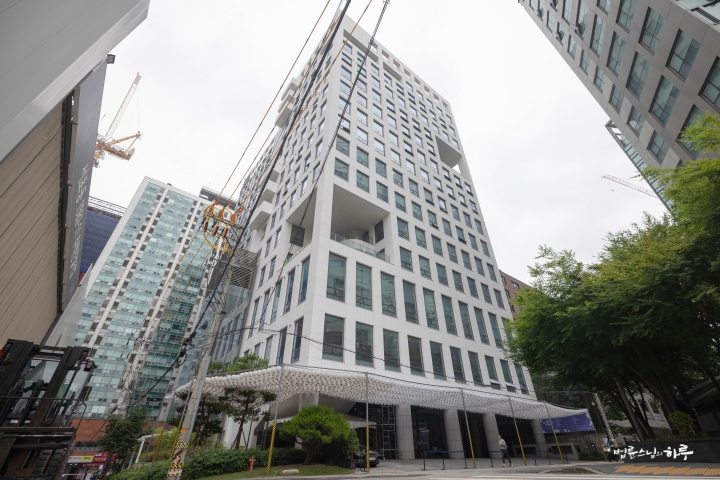
After completing morning practice and meditation, Sunim headed to the Jungto Social and Cultural Center. He started the day with a breakfast meeting with North Korea experts at 7 AM.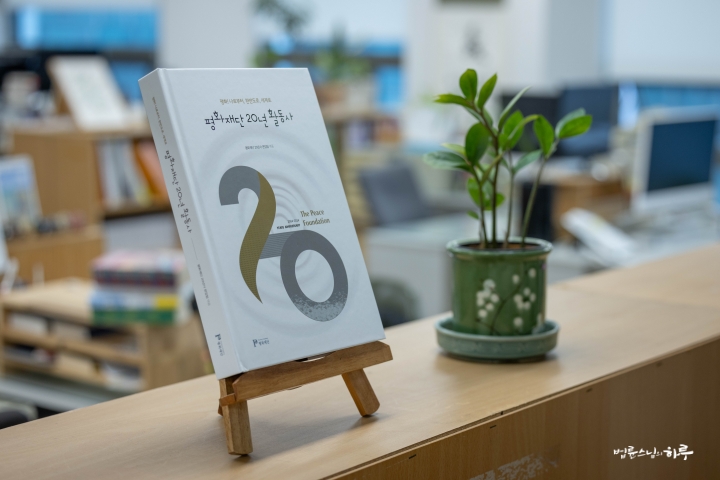
After reviewing North Korea’s price trends and exchange rates, they analyzed from various angles how the Israel-Iran war and the U.S. attack on Iran might affect the situation on the Korean Peninsula. The meeting concluded after discussing prospects for future U.S.-North Korea relations.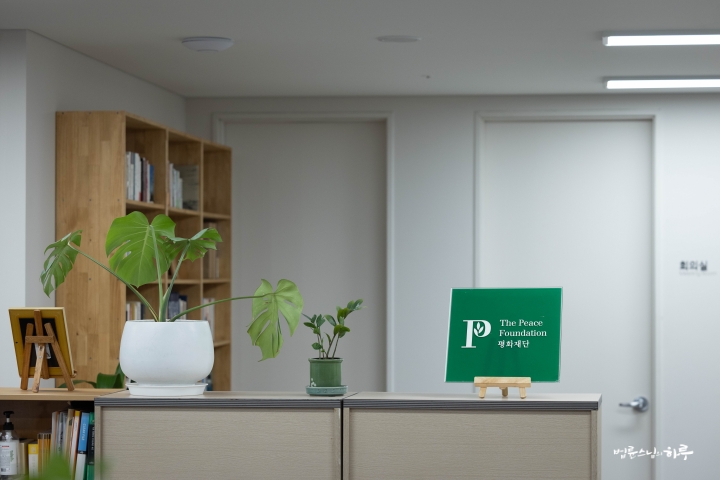
Next, Kang Dae-in, Honorary Director of the Academy of Dialogue Culture, visited to share progress since starting preparations for the ‘Transition Forum’ last month and to discuss future operational plans.
At noon, Sunim had lunch with the Sangha members in the basement dining hall and then headed to the auditorium on the 9th floor.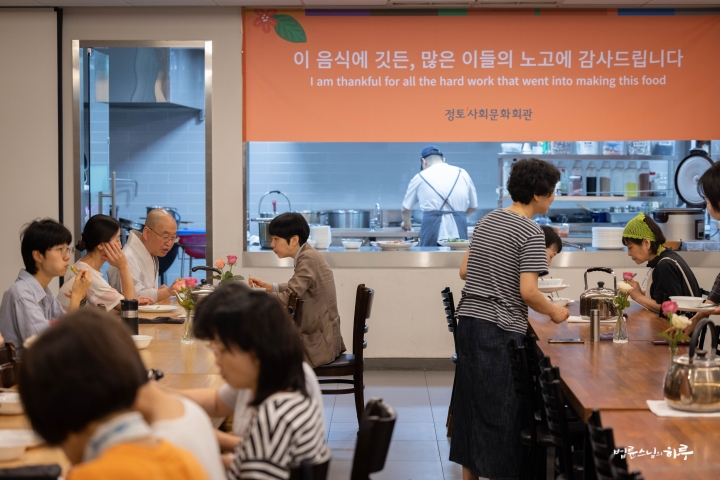
From 1 PM, he attended the Peace Foundation’s regular symposium on the theme of “Sustainable National Development and Foreign Policy & Security Strategy for the Lee Jae-myung Administration.”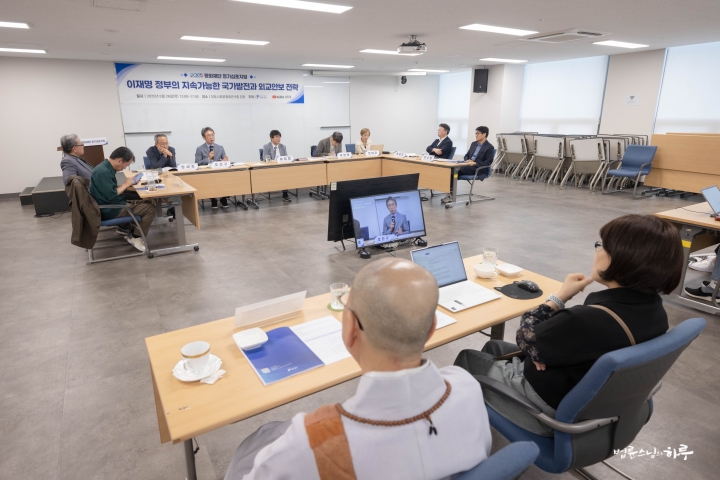
Since its founding in 2004, the Peace Foundation has been researching, educating, and practicing visions for peace on the Korean Peninsula and national development for 21 years. Today, they gathered various experts to pool collective intelligence for peace on the Korean Peninsula. This symposium was conducted entirely online without an audience. With over 330 people connected to the live broadcast, the symposium began with great applause.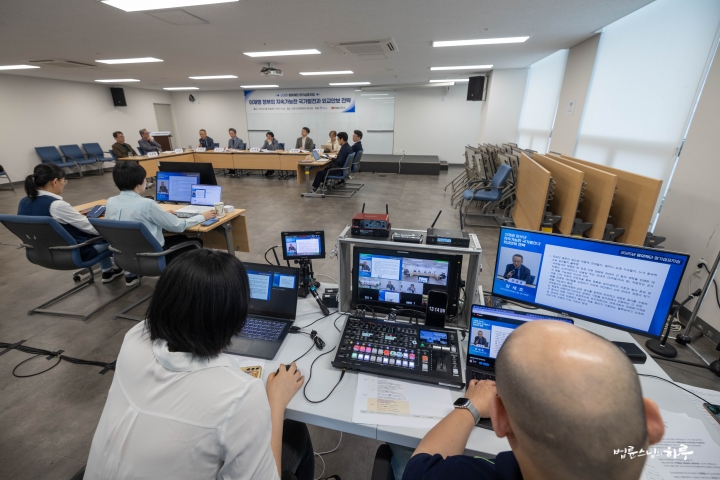
First, Ko Kyung-bin, advisor to the Peace Foundation, presented in his opening remarks the direction Korean diplomacy should take amid the upheaval in world order and the Peace Foundation’s awareness of the issues. He emphasized the need for serious discussion about establishing long-term national strategies, not just simple regime change.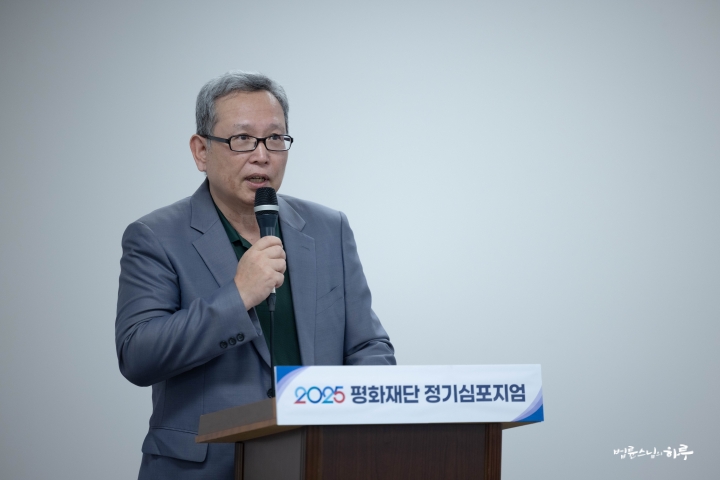
“The foreign policy and security strategy during the two years of the Yoon Suk-yeol administration has operated in a considerably different direction from that of past administrations. As a result, the situation surrounding the Korean Peninsula has become very unstable. We have arranged this gathering today to consider together how to newly construct the Republic of Korea’s foreign policy and security strategy in this situation after the launch of the Lee Jae-myung administration.”
Subsequently, moderated by Professor Lee Jung-chul of Seoul National University’s Department of Political Science and International Relations, Part 1 presented diplomatic strategies for the United States, China, Japan, and Russia, while Part 2 featured discussions by Dr. Lee Soo-hyung, Dr. Dong Yong-seung, Dr. Ko Kyung-bin, and Dr. Cho Han-bum, who each presented their opinions on the government’s foreign policy and security direction.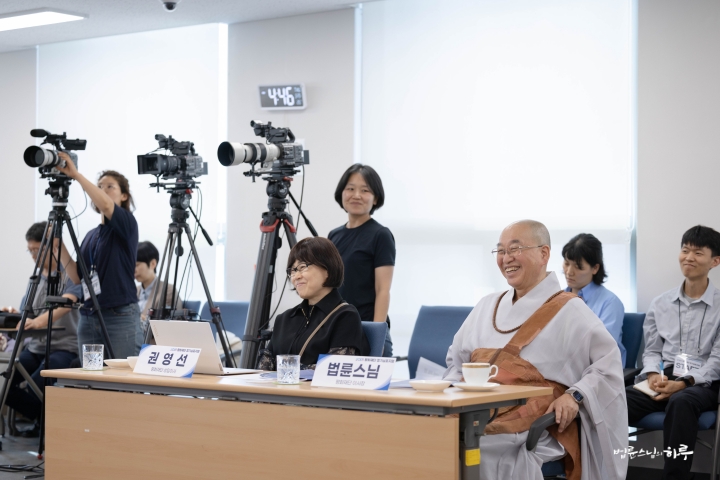
Dr. Jang Se-ho from the Institute for National Security Strategy emphasized that despite the contraction of Korea-Russia relations after the Ukraine war, relations with Russia cannot be severed from geopolitical and economic perspectives.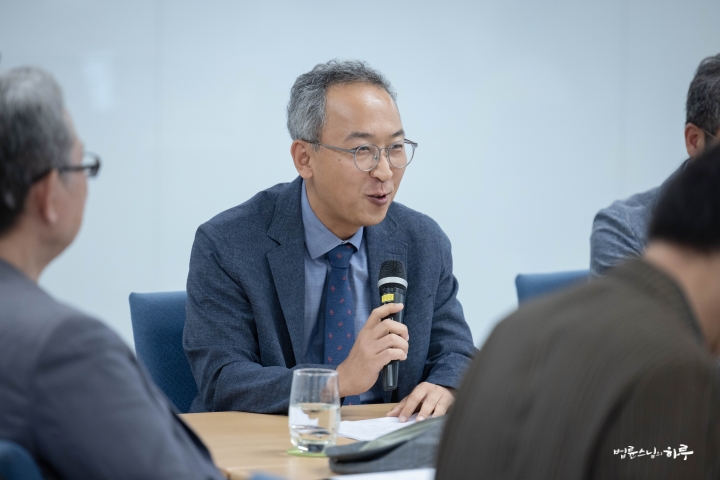
“While Korea-Russia relations have significantly contracted since the Ukraine war, Korea cannot completely sever its geopolitical and economic connections with Russia. Particularly in a situation where North Korea-Russia ties are strengthening, Korea must restore strategic communication channels and secure room to play a mediator role. For example, we can pursue short-term trust-building measures through restoring direct flight routes, cooperation in protecting Korean residents, and expanding educational and cultural exchanges, while also exploring foundations for medium- to long-term cooperation in Far East development, energy, and infrastructure.”
Dr. Cho Jin-gu from Kyungnam University’s Institute for Far Eastern Studies analyzed that while Korea-Japan relations contain structural conflicts, both countries recognize the need for strategic cooperation.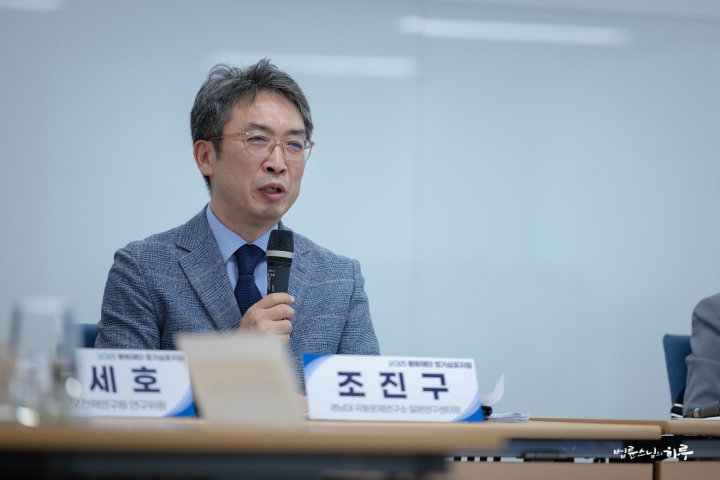
“Korea-Japan relations carry structural conflicts centered on historical issues, but at the same time, the need for strategic cooperation is growing. The Lee Jae-myung administration should maintain the principle of victim-centeredness while creating an environment where practical solutions can be sought by exercising political flexibility. Clear limits need to be set on the expansion of Korea-U.S.-Japan security cooperation as part of the Taiwan issue or Indo-Pacific Strategy. ‘Strategic boundary-setting’ is required to prevent Korea from being automatically incorporated into Japan’s rearmament and military strategy expansion.”
Professor Lee Hyun-tae from Seoul National University’s Graduate School of International Studies explained China’s emphasis on consistency and predictability in diplomacy, arguing that the Lee Jae-myung administration should pursue pragmatic diplomacy with strategic clarity beyond ambiguous attitudes.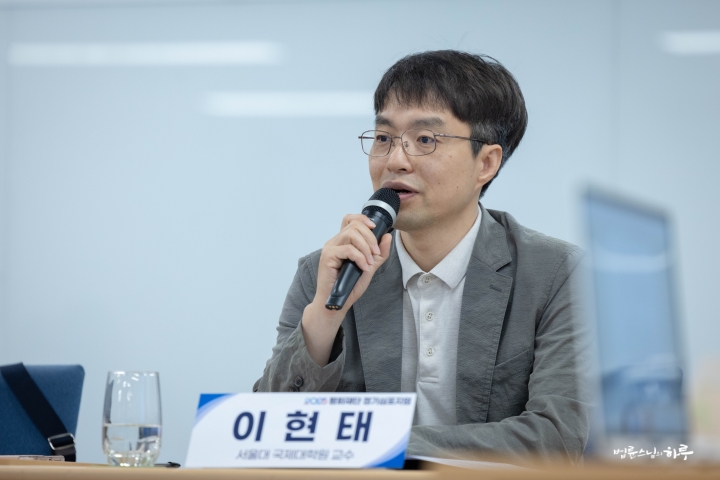
“China is a country that highly values the strategic consistency and predictability of its counterparts. While maintaining ‘strategic ambiguity’ might be advantageous for Korea, from China’s perspective, it can be perceived as an attitude that makes it difficult to build trust. The Lee Jae-myung administration needs to pursue pragmatic diplomacy with strategic clarity toward China. Economic cooperation damaged after the THAAD incident can find opportunities for recovery in non-political areas such as climate change, health, and food security. The keynote of public diplomacy should be a harmony of ‘cautious approach to political sensitivities’ and ‘active cooperation in non-political areas.'”
Dr. Min Tae-eun, research fellow at the Korea Institute for National Unification, emphasized that while the Lee Jae-myung administration should strengthen its alliance with the United States, it must place strategic autonomy and flexibility at the center of its diplomatic strategy.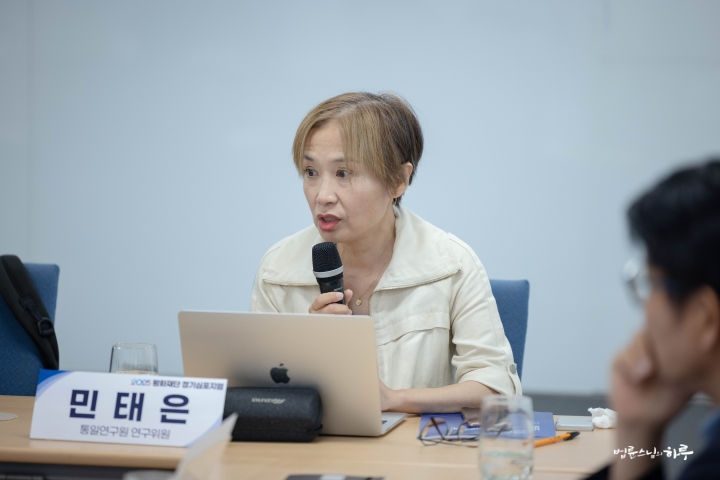
“While pursuing a strengthened strategic alliance between Korea and the U.S., it is important to secure Korea-led policy space. The Lee Jae-myung administration should strengthen ‘strategic autonomy’ rather than simple alignment in cooperation with the United States, and should move in a direction that utilizes the alliance while securing diplomatic space necessary for peace on the Korean Peninsula and progress in inter-Korean relations. Technology alliances should also be pursued in ways that do not undermine the competitiveness and autonomy of Korean industries. A diplomatic strategy is needed that actively participates in supply chain reorganization discussions for core industries such as semiconductors and batteries, while prioritizing the interests of our companies.”
The experts presented as core diplomatic strategies: strengthening autonomous alliance without subordination to the United States, restoring trust based on practical cooperation with China, political flexibility and strategic line-drawing with Japan, and restoring communication channels and performing a mediator role with Russia.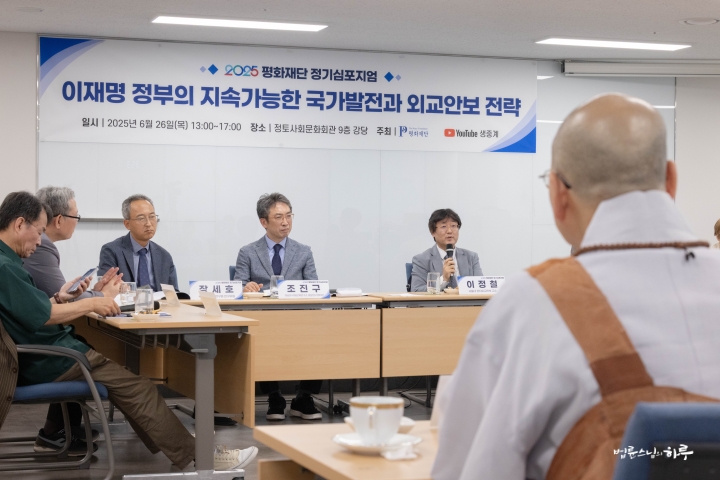
Dr. Nam Ki-jeong from Seoul National University’s Institute for Japanese Studies emphasized that restoring Korea-Japan relations requires long-term and structural relationship restructuring rather than short-term solutions or political approaches. He particularly pointed out that Korea and Japan must work together to solve the dual tasks of ‘geopolitical crisis management’ and ‘sharing civilizational common challenges.’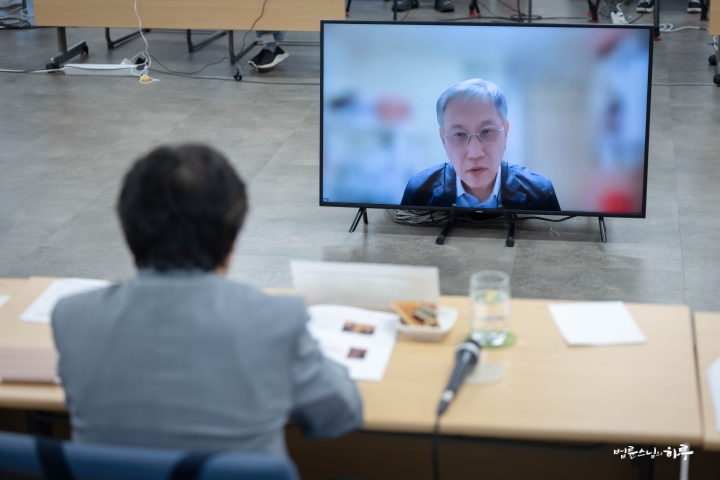
Dr. Lee Soo-hyung from the Institute for National Security Strategy emphasized that while recognizing the need for Korea-U.S.-Japan cooperation, securing Korea’s strategic autonomy is most important.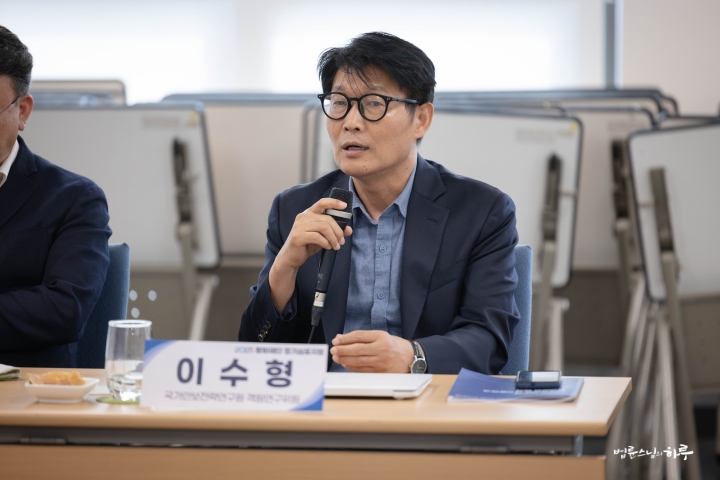
“While alliances are necessary, the key is not losing initiative in determining which direction we will go. In the current international order, alliances are expanding into various areas including economics, technology, and values, but if Korea fails to secure autonomy within this flow, it could ultimately become subordinate in other areas as well.”
Dr. Dong Yong-seung, Secretary General of Good Farmers, pointed out that areas where cooperation possibilities can be found clearly exist even within strained Korea-China relations.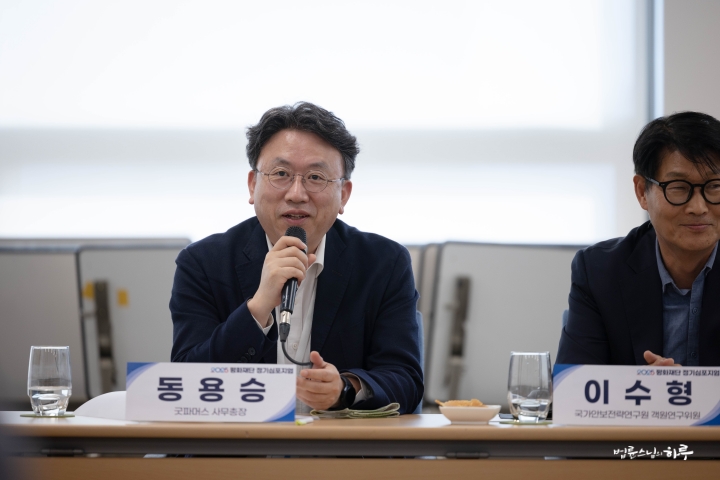
“In areas like agriculture, food, health, and climate change response, structures where common interests can be found sufficiently exist. It is important to restore trust in non-political areas, and such exchanges are possible at the civil society level as well.”
Dr. Cho Han-bum, senior research fellow at the Korea Institute for National Unification, argued that a sanctions-only approach to the North Korea issue inevitably has limitations.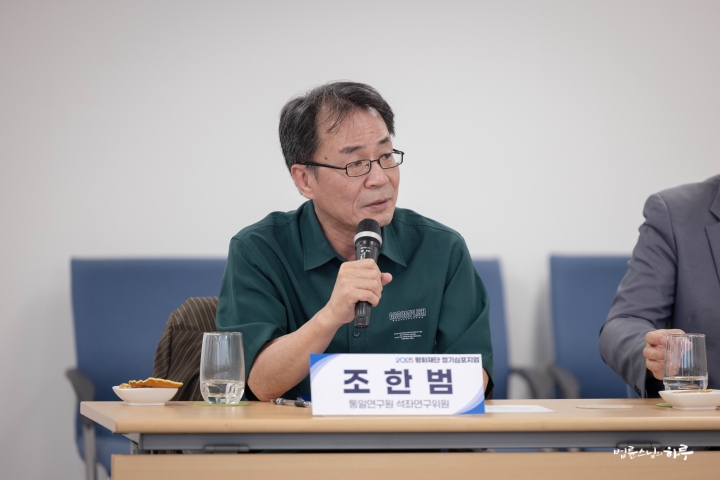
“Sanctions are necessary but insufficient by themselves. At times like these, we must actively utilize the indirect approach of humanitarian aid. And that aid should be designed not as simple charitable measures, but as strategic means that can restore momentum in inter-Korean relations and have national persuasive power.”
Concluding the discussion, moderator Professor Lee Jung-chul from Seoul National University said that country-specific strategies should not exist in isolation, and all diplomatic strategies must operate harmoniously within an integrated framework.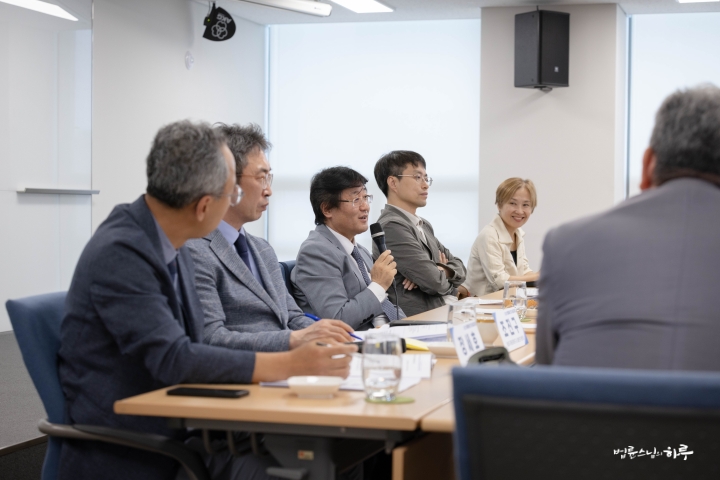
“‘How to balance between the two axes of alliance and autonomy, values and practicality’ will be a very important task in future policy design.”
This symposium was an opportunity to reflect on the core values of foreign policy and security strategy that the Lee Jae-myung administration should pursue amid upheavals in the international situation. Common proposals emerged that ‘autonomy,’ ‘practical cooperation,’ ‘philosophical consistency,’ and ‘humanitarian approach’ must be harmonized even in relationships with major powers.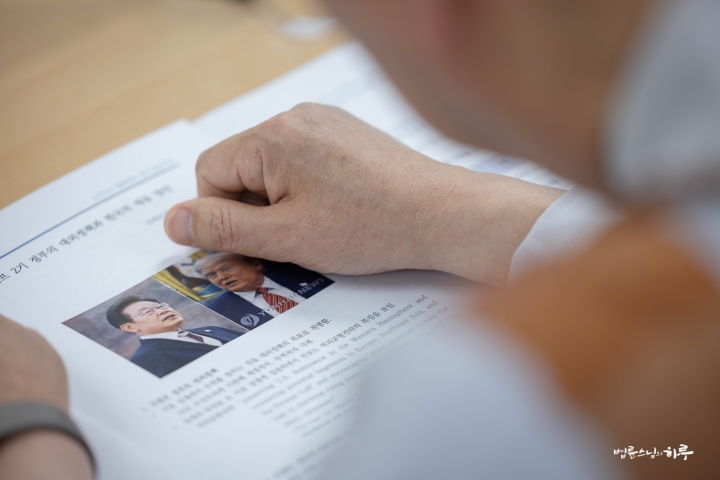
As the discussion was becoming increasingly animated, word came that the INEB Jungto Society delegation from Southeast Asia had all arrived at the Jungto Social and Cultural Center. Sunim briefly rose from his seat and moved to the Dharma Hall on the 3rd floor.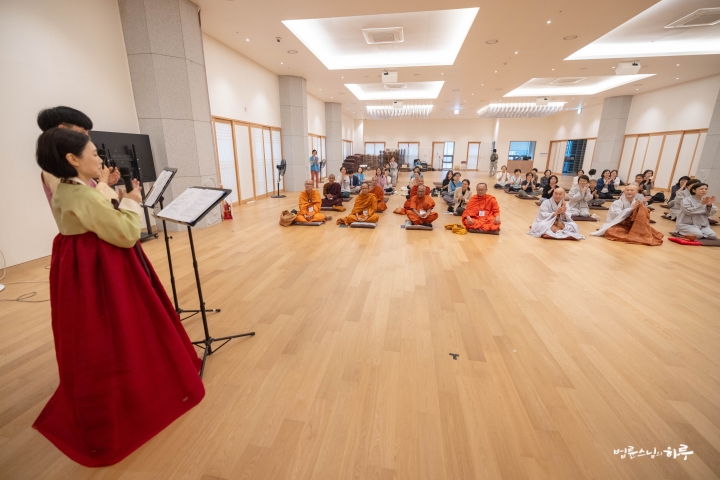
Two young people dressed in beautiful hanbok welcomed the INEB Jungto Society delegation.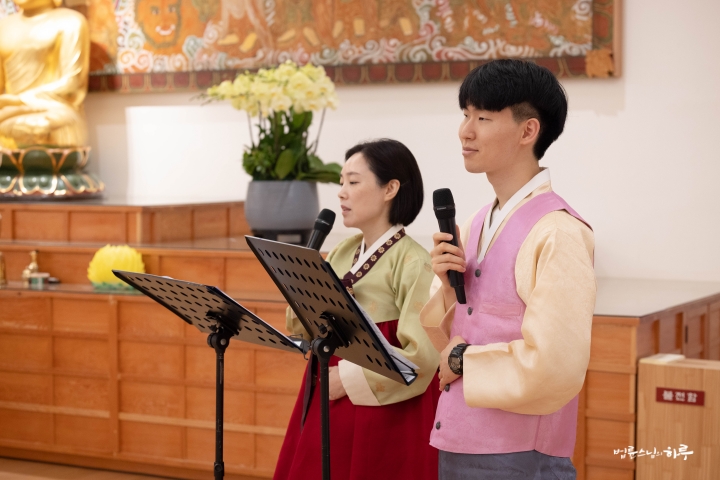
“We would like to welcome our INEB study trip participants to the Jungto Center.”
Three people came from Thailand, two from Cambodia, one from Myanmar, one from Laos, and one from Sri Lanka, for a total of eight visitors. After everyone offered three bows before the Buddha together, Sunim gave welcoming remarks for the INEB Jungto Society delegation.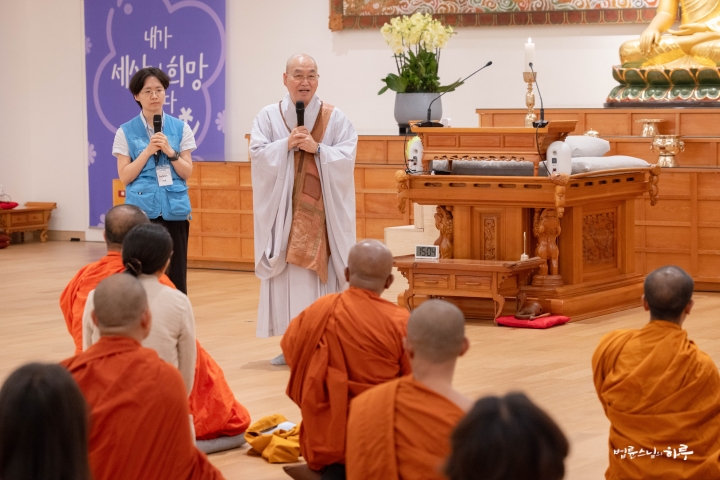
“Members of the INEB (International Network of Engaged Buddhists) delegation, I sincerely thank you for making this long journey to visit us. I see that some of you have visited once or twice before. It’s especially wonderful to see familiar faces again.
A Time for Dialogue to Discuss What We Can Practice Together
While previous visits focused on touring Jungto Society in Korea, this time will be an opportunity to discuss how we can practice together, spread the Dharma, and continue social engagement. However, since staying only in Seoul for continuous meetings could become tedious, this itinerary will move between three locations: Mungyeong Jungto Retreat Center, Dubuk Jungto Retreat Center, and Silsangsa Temple on Mt. Jiri. Most importantly, this time we want to focus on dialogue rather than tours.
As we all feel, the world is now very chaotic. War is no longer just a story from history but is increasingly expanding in the reality we live in. While religions speak of peace, religious conflicts lie deep behind many wars. Additionally, natural disasters due to the climate crisis are becoming more frequent globally, and the wealth gap is widening at an alarming rate. It almost seems as if new classes and caste systems are emerging. In these times, I would like to think together about how we can realize the Buddha’s teachings of equality and freedom in today’s world. 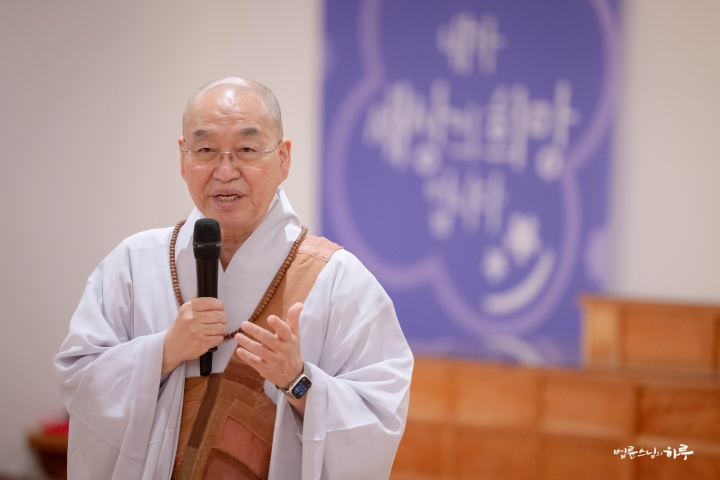
Finding the Path Through Buddha’s Teachings in Times of Turmoil
These issues cannot be resolved by discussing them only within temples or monasteries. The Buddha himself walked from village to village every day, resolving various social problems of his time through dialogue with people. Similarly, we must work together with people to solve problems in the very places where they live their lives. I hope this time we can have deeper conversations about these specific matters. 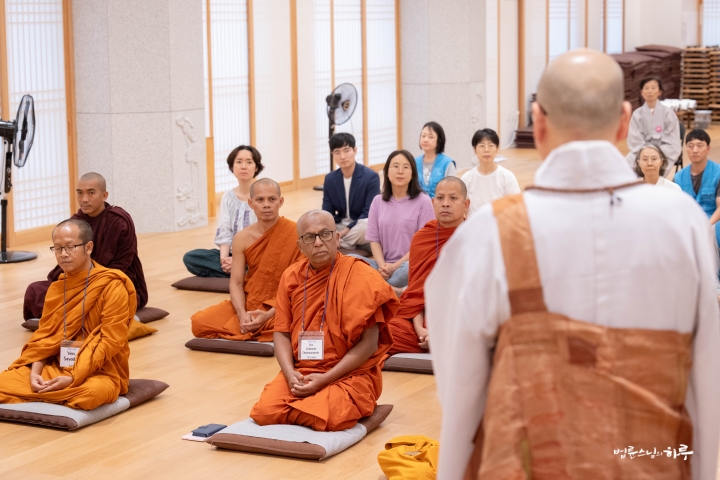
Korean society has experienced great turmoil over the past six months. It took six months from the martial law crisis and presidential impeachment through an early election to the establishment of a new government. Currently, a symposium is being held at the Jungto Social and Cultural Center to discuss how the current government will establish strategies for sustainable development and diplomatic security for Korean society. I was participating in that event and came down briefly to meet with you all. 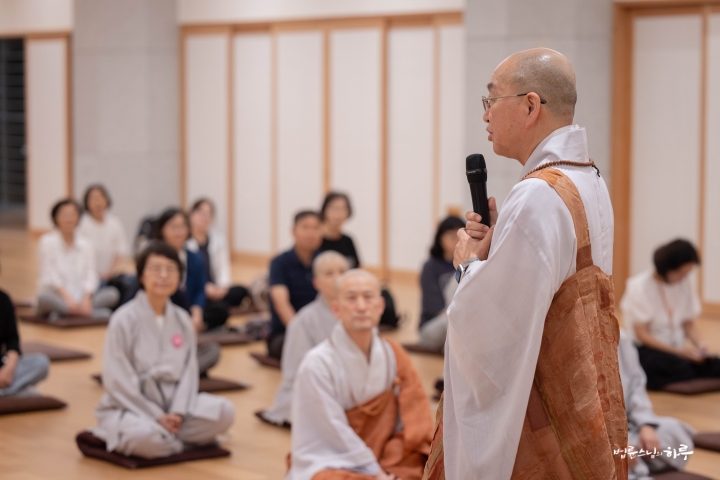
I sincerely welcome all of you who have visited us. I hope that all the members of the Sangha gathered here will also welcome our guests from overseas with warm hearts. Thank you.” 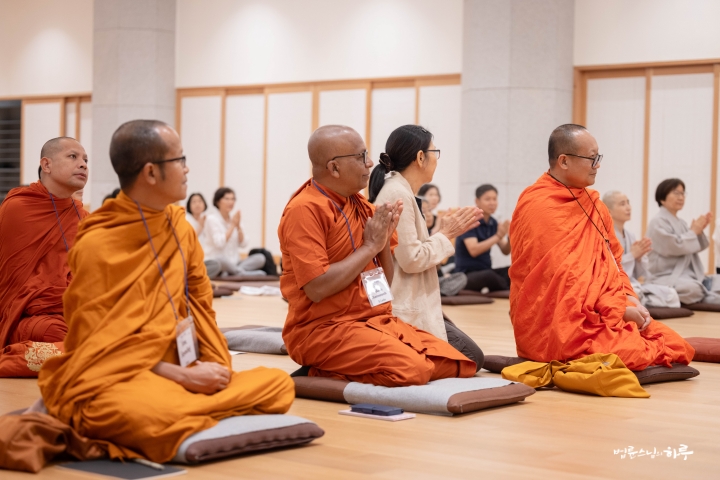
Following this, all members of the Sangha offered three prostrations to the INEB participant monks as a greeting.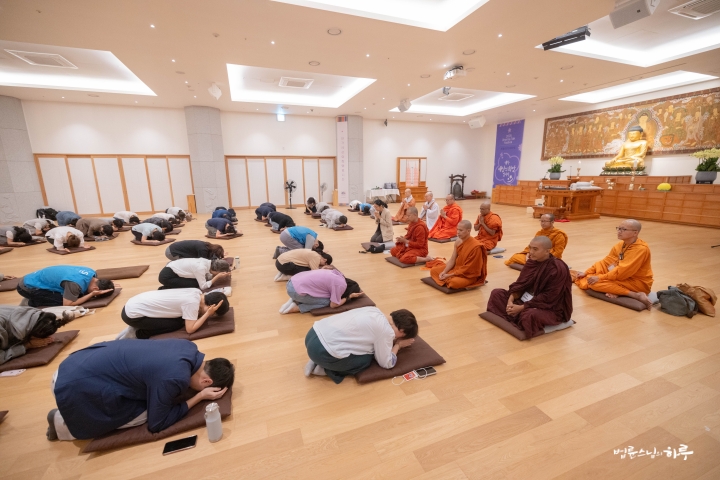
Next, representing the INEB participant monks, Ven. Galkande Dhammananda from Sri Lanka gave a greeting.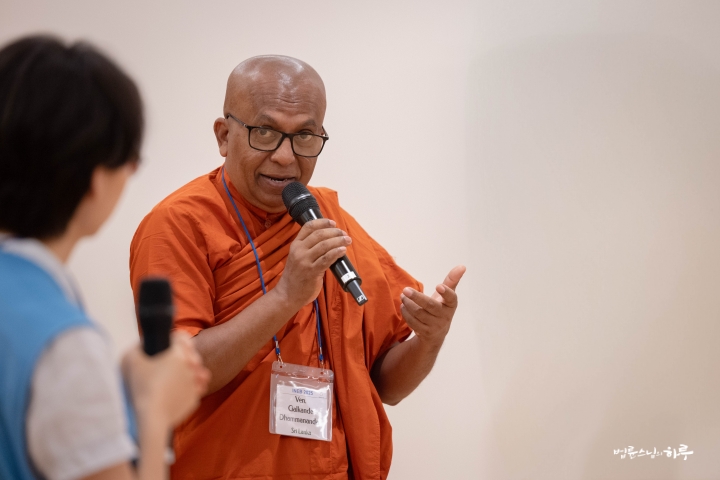
“It is very meaningful that people working in various regions around the world have gathered in one place during such difficult times. While it’s hard to maintain a broad perspective when focusing on local situations in our respective places, gathering together like this allows us to reflect on each other’s activities and refresh ourselves. And when we return to our respective places, we can approach our activities with a broader perspective.
This meeting will serve as a living role model for all of us. While role models in books can be forgotten once the book is closed, living role models we meet face-to-face leave a deep inspiration. I deeply thank Venerable Pomnyun Sunim and the members of the Jungto Society lay Sangha, and I also express my gratitude to INEB for arranging this precious occasion.”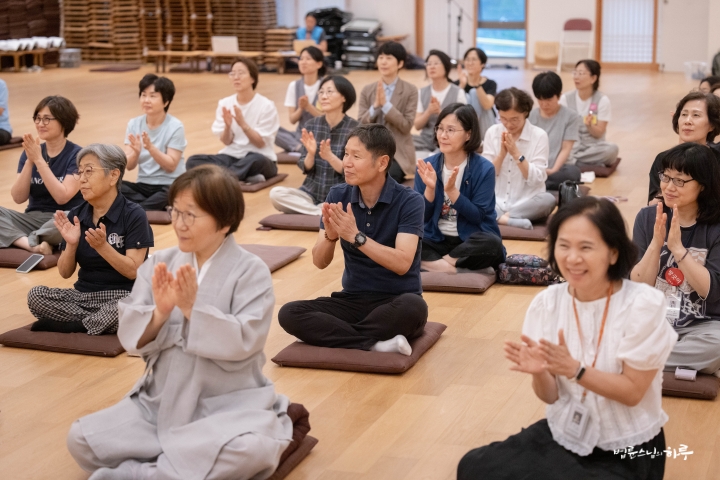
Following this, Kim In-hwan from the Special Youth Division sang a song welcoming the monks. The atmosphere quickly became warm and friendly, and bright smiles spread across the faces of the Southeast Asian monks.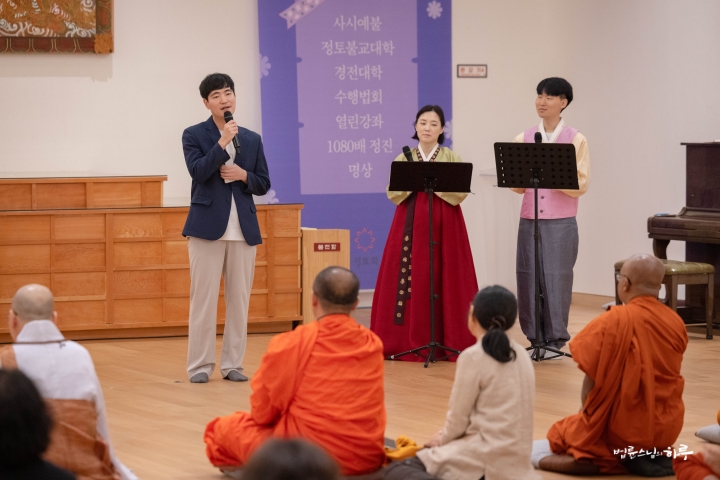
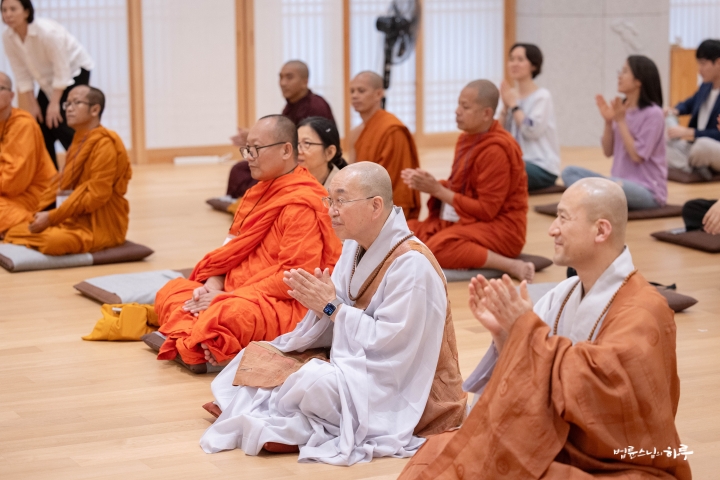
Then Sunim presented each participating monk with a flower, pocket money for their stay, towels, and information packets.
“Welcome to Jungto Society.” 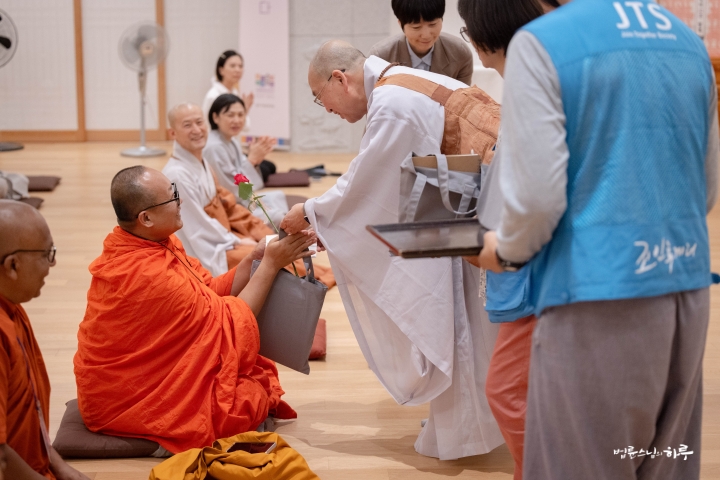
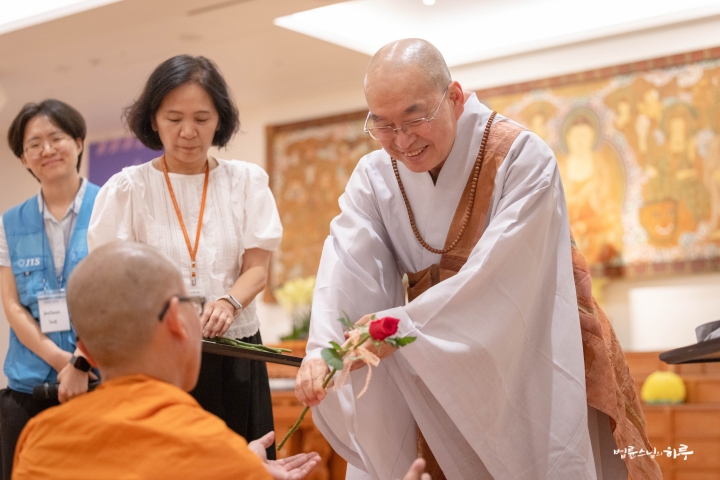
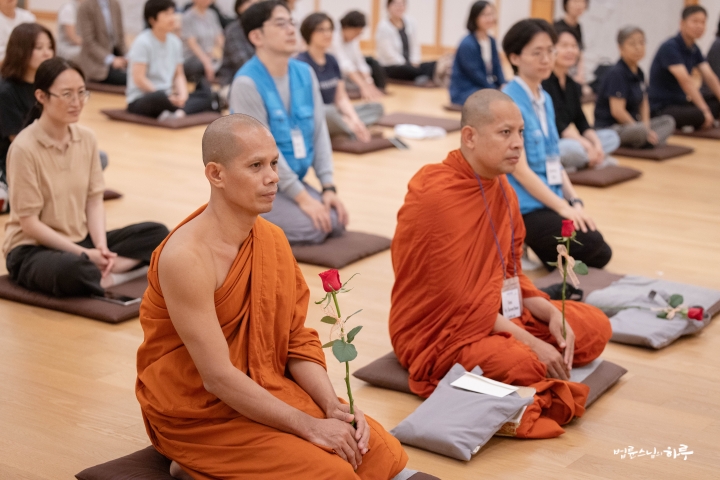
The welcome ceremony concluded with a commemorative photo session. In front of the Buddha, everyone shouted “Welcome, INEB” together with bright smiles.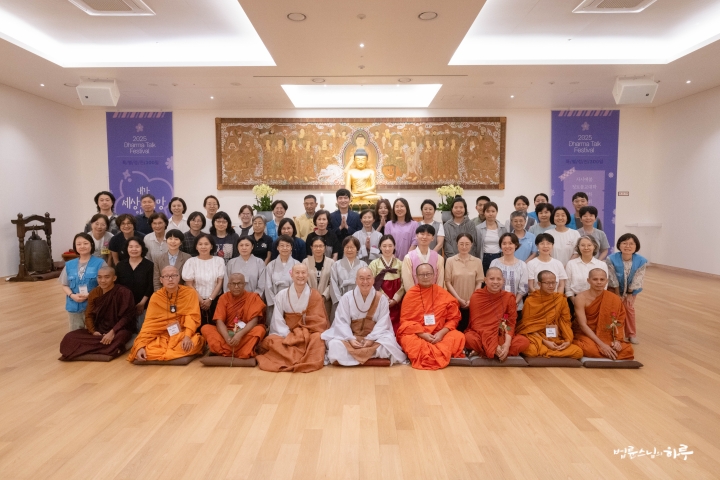
Sunim asked for the understanding of the INEB participant monks.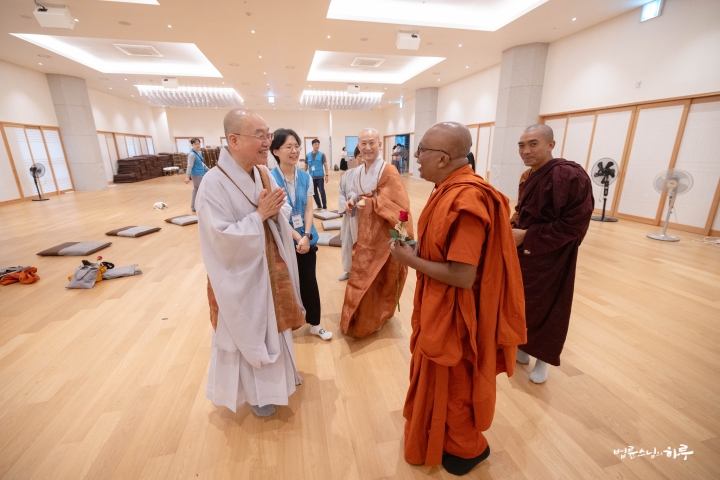
“I need to return to attend The Peace Foundation symposium, so I’ll take my leave now. We have a dialogue session in the evening, so I’ll see you then.”
After the welcome ceremony, the INEB participant monks had an orientation session. Sunim moved back to the 9th floor auditorium to attend The Peace Foundation symposium.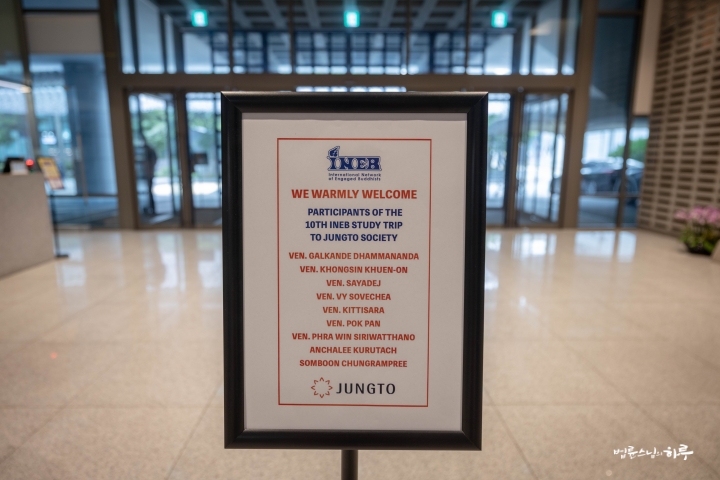
The experts’ discussions and presentations continued for four hours. After the discussions and presentations ended, the moderator asked Sunim for closing remarks to conclude the symposium. Sunim emphasized careful response in times of uncertainty, the priority of preventing war, and a proactive approach toward the future.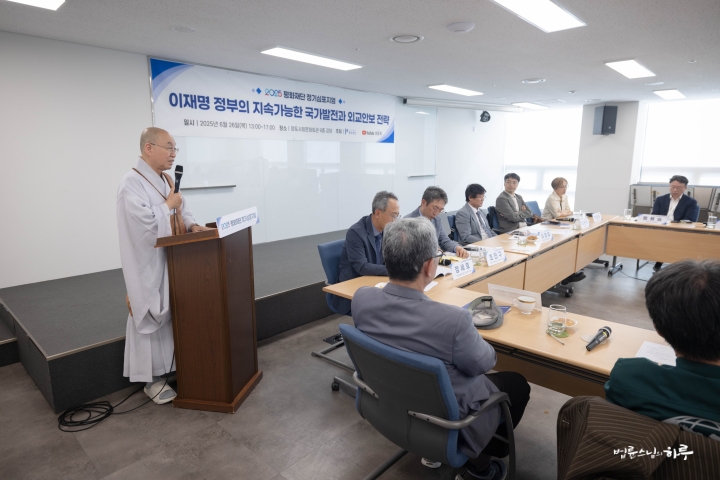
“I listened well to the four presentations and four discussions on the Republic of Korea’s diplomatic and security strategy. I think this is exactly what gathering collective wisdom looks like. I hope we can spend more time together finding common ground in the future. I deeply thank everyone who gave valuable presentations today. 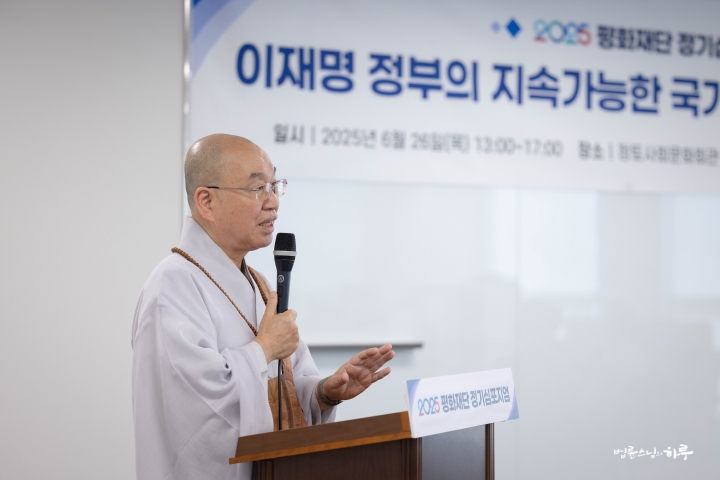
In Times of Rapid Change, How Should We Respond When Uncertainty Is High?
To briefly share my thoughts, when changes occur rapidly, it may be wiser to wait and observe rather than respond hastily. In situations where outcomes are difficult to predict, hasty reactions can lead to judgments born from impatience. It’s not out of cowardice or lack of courage, but rather a careful attitude of observing and judging the situation that is especially necessary in times of great uncertainty like now.
In that context, issues like the US-China hegemonic competition or the climate crisis should also be approached carefully rather than definitively. Nuclear power certainly has risk factors, but it could also be seen as clean energy in that it doesn’t emit carbon dioxide (CO₂). Therefore, rather than hastily changing policies just because the administration has changed, it would be advisable to proceed with what has already been planned while putting on hold what hasn’t been confirmed yet, approaching things carefully. Since most issues we face now contain many uncertain elements, we need an attitude of calmly working through them rather than rushing. 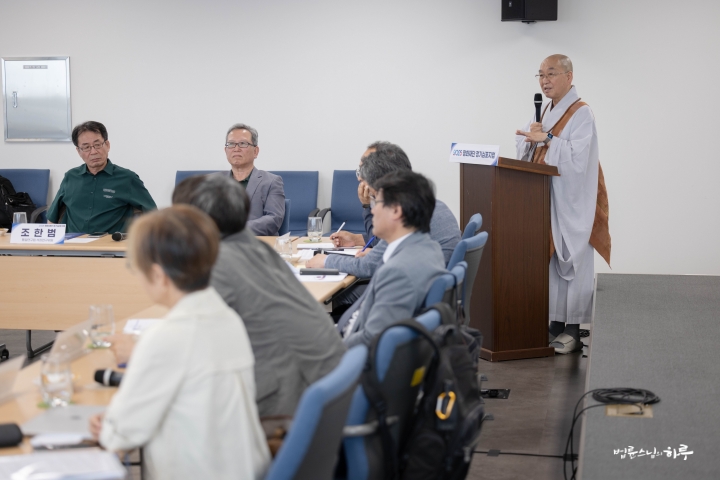
However, while the short-term outlook remains uncertain, there are some trends that can be predicted with reasonable certainty in the long term. For instance, in the case of the climate crisis, it is clear that demand for clean energy will increase over time. Such issues require bold policy shifts and proactive investment. Similarly, while the outcome of the U.S.-China hegemonic competition remains uncertain, what is clear is the importance of solidarity among middle powers that are not hegemonic nations. Therefore, these matters require a proactive approach rather than a wait-and-see attitude. From this perspective, regarding relations with Japan, while we need to be cautious about cooperation considering historical issues, we must also find areas where we can transcend the past and cooperate for the sake of the future.
At this moment, our most urgent task is to prevent war from breaking out on the Korean Peninsula. War represents the greatest crisis, incomparable to any other threat. We must prevent the Korean Peninsula from becoming a conflict zone due to inter-Korean tensions or the spillover effects of U.S.-China competition. This is not the time to focus on whether the two Koreas constitute one nation or two separate states. We must concentrate solely on preventing war. We need to take swift measures to substantially improve inter-Korean relations and ensure peace. Whether the government should respond quickly beyond public opinion or approach cautiously while considering both public sentiment and the situation requires appropriate adjustment of pace depending on circumstances. 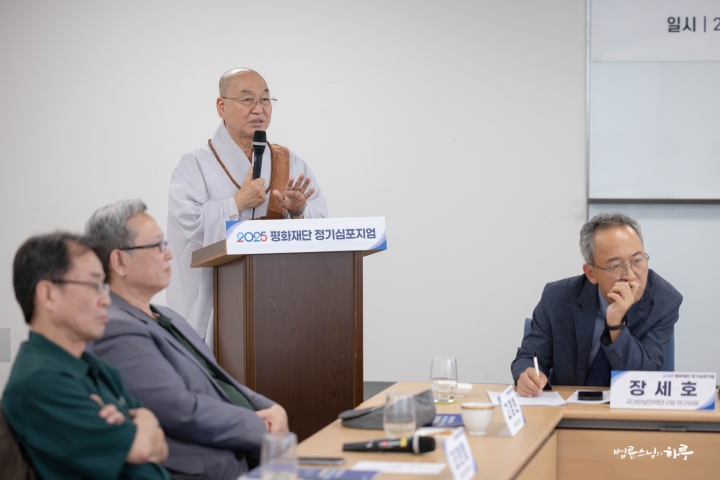
The Need for Pragmatic Diplomacy and New National Strategy
While we should not overestimate our country’s position regarding diplomatic and security strategies, we must also move beyond the underestimation that has led us to rely solely on the United States or constantly watch China’s reactions. In a reality where the United States moves strictly based on its own national interests, the attitude of unilaterally depending on the U.S. as in the past is no longer appropriate. We need to place our own national interests at the center and approach matters from a more pragmatic perspective. While respecting past relationships, we should not be bound by them, and while considering the current situation, we must not become so immersed that we fail to look toward the future. In this regard, I fully agree that there is a need to establish a new national strategy.
I hope that The Peace Foundation and experts will continue to contribute to the establishment of the nation’s diplomatic and security strategies. These days, social attention tends to focus mainly on economic issues. While individual lives are certainly important, the most crucial challenge we face at this moment is how to maintain peace and lead our nation’s sustainable development. From this perspective, I would like to make one request to our viewers. Please pay attention to diplomatic and security issues as much as economic matters, and participate in forming public opinion on national policies.” 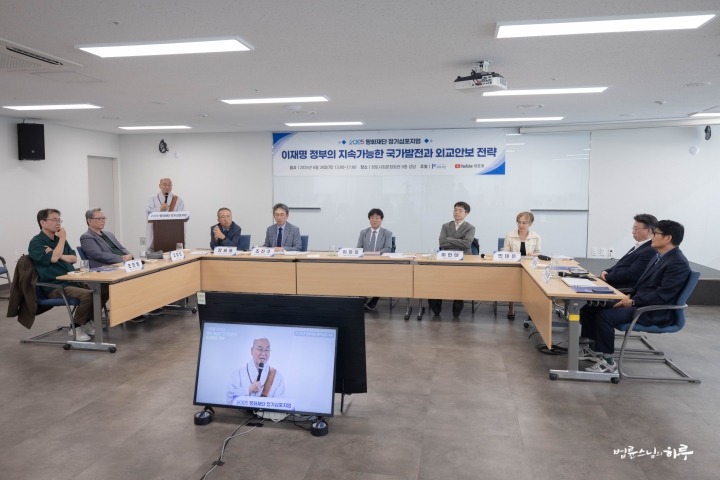
Both the presenters and discussants expressed their agreement with Sunim’s words with loud applause.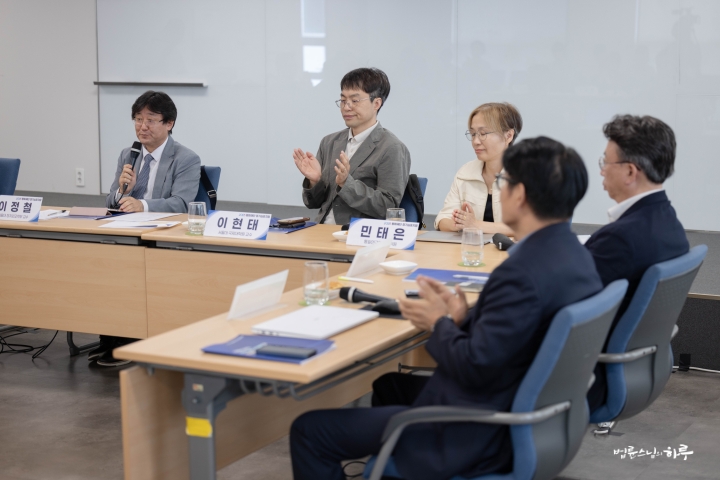
After finishing the live broadcast at 5 PM, Sunim took a commemorative photo with all the presenters and discussants.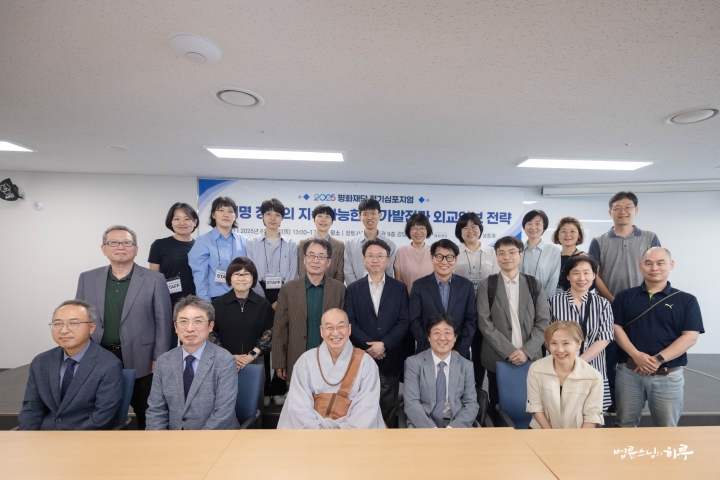
The presenters and discussants moved outside for dinner, while Sunim excused himself and headed to the reception room at The Peace Foundation.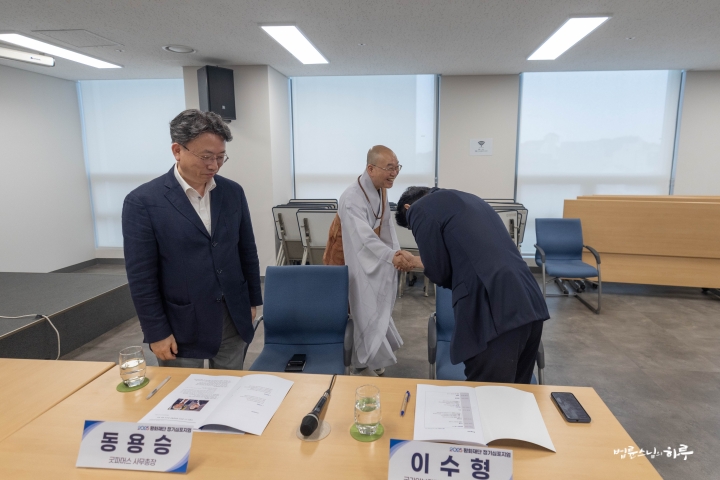
“I’m sorry I can’t join you as I have another appointment. Please continue your conversation over dinner.”
At 5:30 PM, Sunim welcomed a guest who had come to visit The Peace Foundation. He met with Congressman Kim Byung-joo of the Democratic Party of Korea, and they had dinner followed by tea and conversation. They discussed many topics regarding crisis management strategies in the security sector.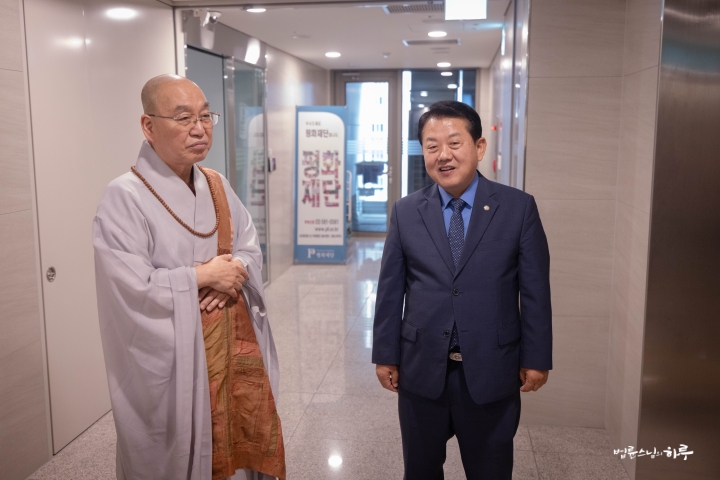
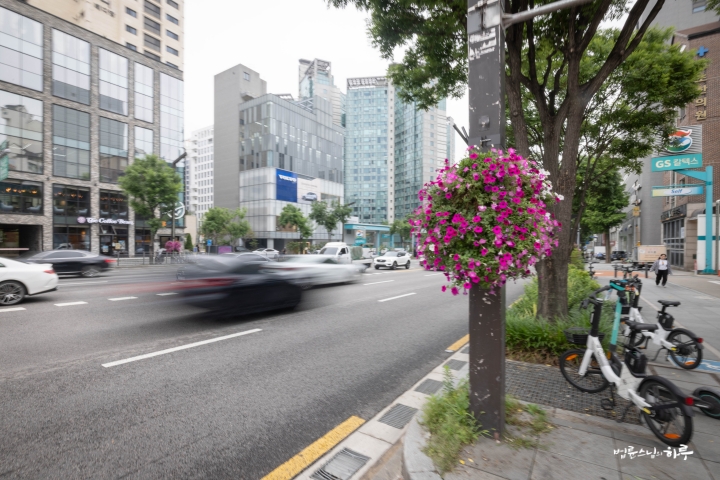
After sunset, from 7 PM, Sunim had a dialogue session with the INEB Jungto Society visiting delegation. Sunim began the conversation by asking the monks from various countries how they had been. They discussed the current situations in areas where JTS provides support, including the earthquake damage in Myanmar, the operation of the girls’ dormitory in Battambang, Cambodia, and the economic crisis in Sri Lanka.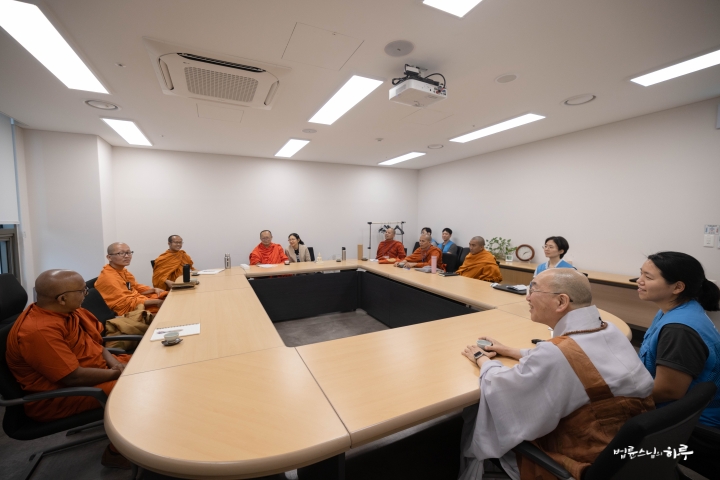
The INEB participants also asked Sunim questions. Ven. Khongsin from Thailand expressed concerns about the declining number of young novice monks and the deteriorating quality of education.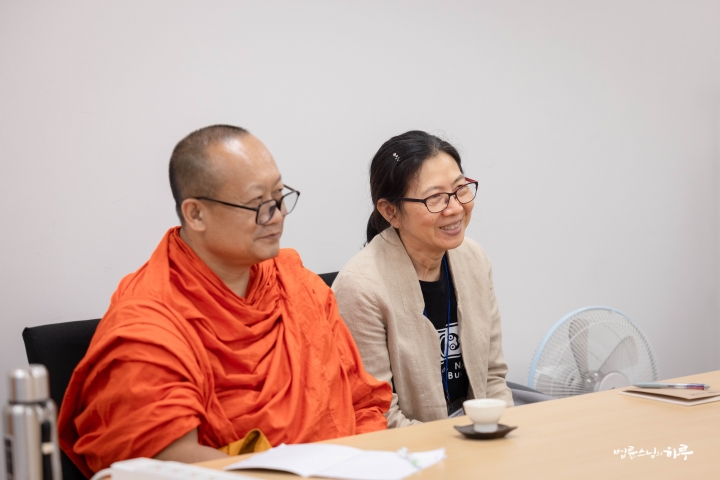
“I’m concerned about the management and education of novice monks. These days, the number of young monks is decreasing. In the past, the problem was that monks who completed their novice education would leave the temple rather than stay. Now, the bigger problem is that the number of novices receiving education is decreasing in the first place. Another issue is the quality of education. Currently, the educational outcomes are not even reaching half of our expectations.”
Sunim emphasized that the decline in religious population is a global phenomenon and continued the conversation.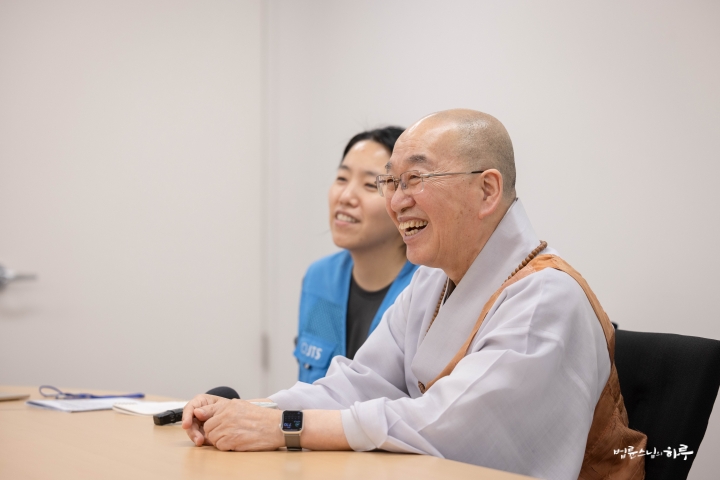
“The decline in religious population is a global phenomenon. The number of people entering monastic life is decreasing in many Buddhist countries including Thailand, Cambodia, and Myanmar. In Korea’s case, with low birth rates and few children, it has become almost impossible for children to become monks. There are hardly any people in their 20s entering monastic life; most enter in their 30s or 40s.
While it’s important to teach traditional aspects in monastic education, we need to go further and provide education that enables monks to understand and address people’s suffering as leaders. The content of my Dharma talks is based on Buddhist teachings, but I rarely use Buddhist terminology. Instead, I use everyday language that anyone can understand. Buddhism needs to respond to these changing circumstances.”
Ven. Kittisara from Myanmar also asked Sunim a question.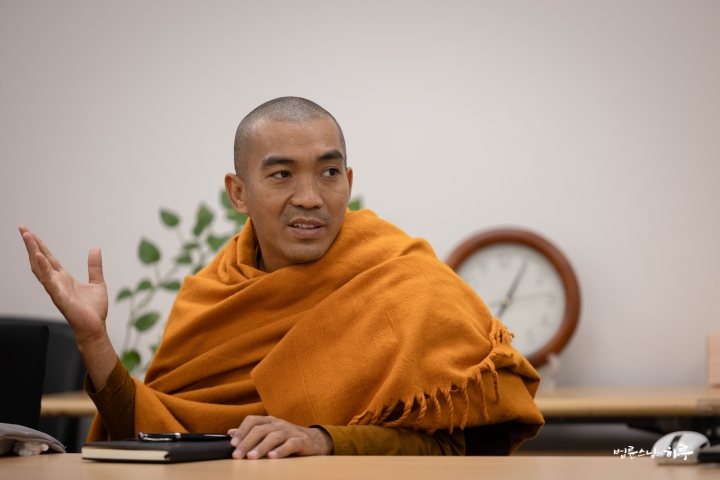
“We come from various countries, many of which are developing nations. I believe these countries are likely to face similar problems to Korea as they go through industrialization. I’m curious if there are any Buddhist teachings or ideas to prepare for such situations.”
Sunim answered.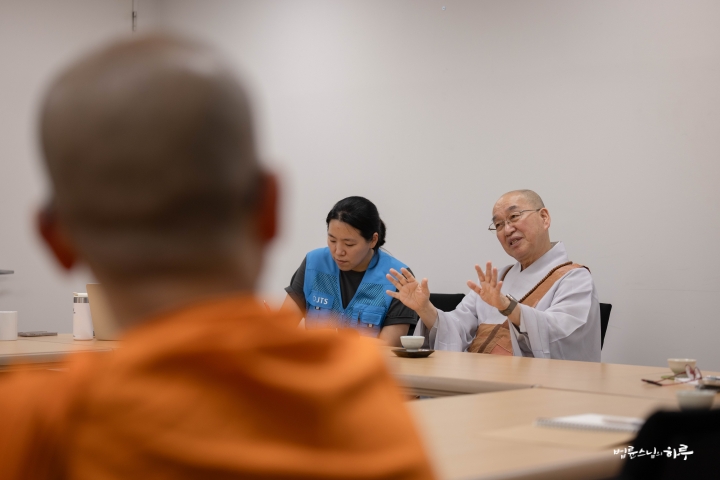
“This is exactly why we’re meeting like this – to share with you the problems Korea has faced first and how we are responding to and overcoming them. However, since these problems haven’t yet become reality for you, they might feel somewhat unfamiliar. From my perspective, I believe you’ll likely face similar problems to Korea within the next 10 to 20 years. Particularly in your countries, workers often go abroad rather than staying domestic. This creates distance from traditional culture and an environment where it’s easier to adopt other religions. If they go to the Middle East, they’re likely to encounter Islam; if they go to Korea or the United States, they’re likely to encounter Christianity. Let’s have many conversations about this during the week.”
After receiving various questions for two hours, Sunim finally introduced the topics he wanted to discuss during this INEB study tour.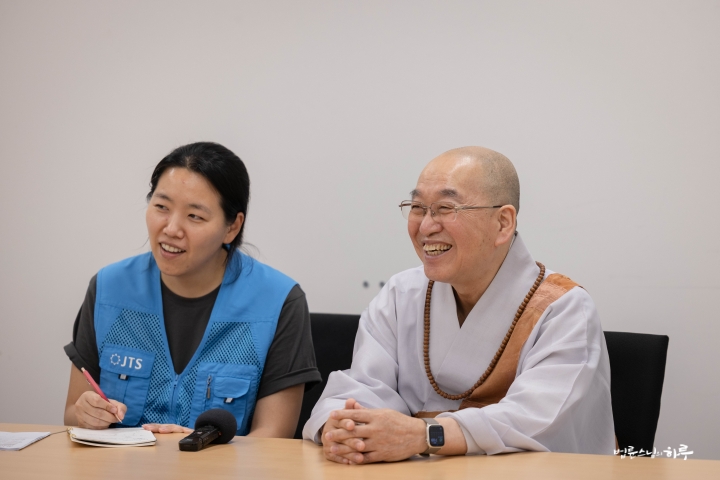
Seven Topics for This INEB Study Tour
“This INEB study tour program aims to have in-depth conversations about seven topics. First is the question of how to conduct Buddhist education – discussing which aspects of the Buddha’s teachings should be emphasized. For example, I believe education emphasizing dependent origination and the Middle Way is appropriate for modern society. Second is training – how to help students experience Buddhism through meditation and various methods. Third is practice – how to help each Buddhist practitioner continue their practice consistently in daily life. Fourth is how to organize and operate Buddhist organizations like Jungto Society. Fifth is how to convey the Buddha’s teachings to ordinary citizens – the methods of spreading the Dharma and promotion. Sixth is how Buddhists should participate in solving social problems in their respective societies. The seventh is a topic we’ve specially added this time. In this era of climate and environmental crisis, how can we achieve sustainable development? Our goal is to alleviate absolute poverty without stimulating people’s desires. I’d like to introduce the regional development program that JTS is conducting in Bhutan to help poor people maintain a minimum standard of living.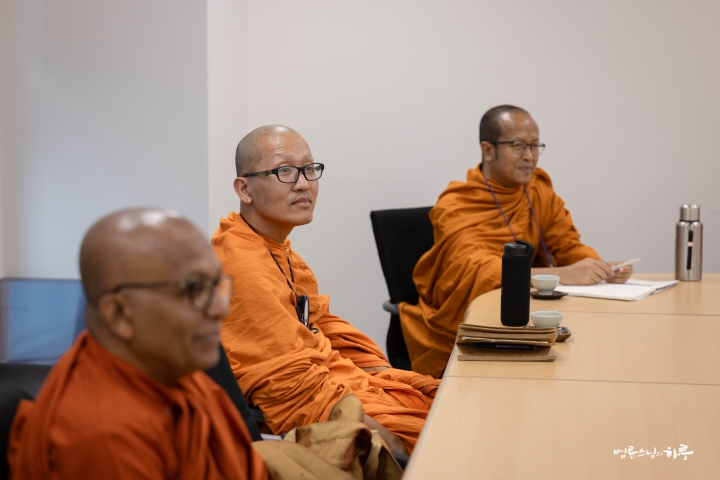
Currently, JTS is operating a poverty alleviation program covering two entire provinces in Bhutan. The main components of the program are as follows: First, building houses for those who don’t have homes. Second, repairing old and dilapidated houses for the poor, with a focus on improving at least the kitchen and toilet facilities. Third, paving village roads that become slippery when it rains. Fourth, installing water supply systems. Fifth, setting up fences to prevent damage from animals. Sixth, maintaining irrigation channels for rice farming. Seventh, partially paving roads that are too steep or become muddy, making them impassable for vehicles. All seven of these programs must be carried out directly by the residents themselves. JTS provides the necessary materials for these activities and helps residents improve their homes and villages on their own. The purpose of this program is to enable people to “live cleanly and conveniently despite being poor.” Since there are still many people without homes or living in poverty in rural areas of Southeast Asia, I would like to discuss with you how we can expand this program. 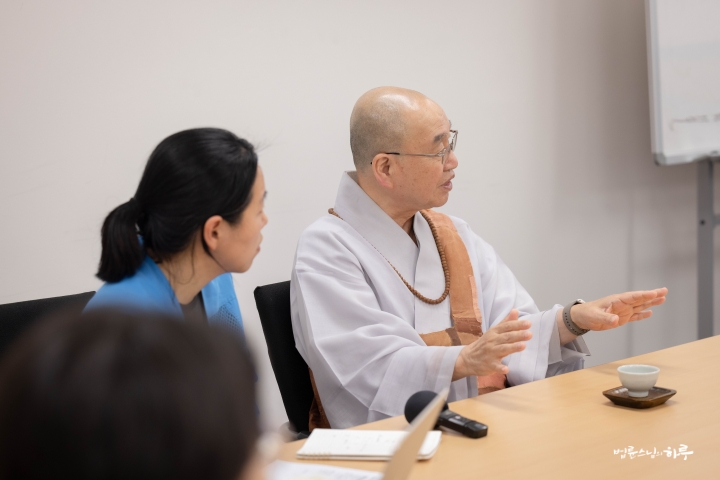
First, I will introduce the activities of Jungto Society, and then it would be great if each of you could introduce your own activities. After that, we can have discussions based on the content, which will make our time together even more meaningful.
How Can Buddhism Change the World?
We have three additional programs. First, we will visit and learn about how traditional Korean meditation halls and meditation centers operate. Second, we will experience and learn about the village development program being conducted with local farmers at Silsangsa Temple, a temple belonging to the Jogye Order. Third, we will hear about the vision and policies the Jogye Order is implementing to manage the order amid the reality of declining numbers of monastics and religious population. Jungto Society is not an activity at the denominational level but has a strong character as a new Buddhist movement. Therefore, Jungto Society’s activities may not serve as a direct model for you who belong to religious orders. Of course, they can serve as a reference. On the other hand, since the Jogye Order oversees Korean Buddhism as a whole, hearing about their policies and vision for leading Buddhism will be very helpful to you. 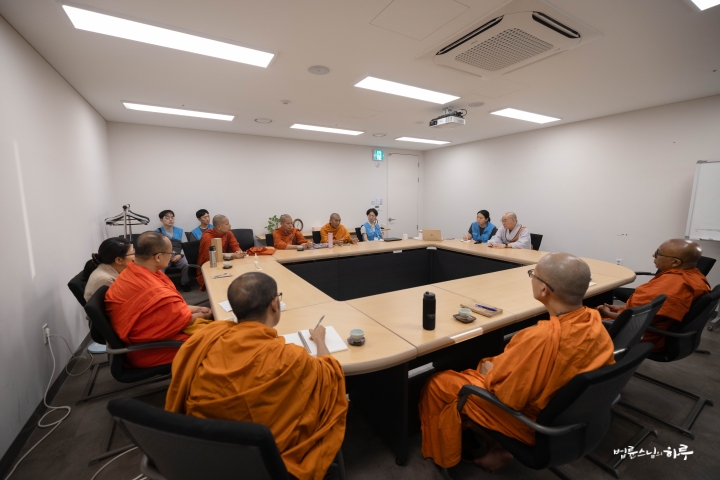
We have prepared these 10 programs. Since most of you are not first-time visitors but have already visited Korea, this time we want to focus more on sharing stories and having discussions rather than simple tours. Also, I hope we can think together about how we can cooperate to solve these problems even after returning to our respective regions. I hope you will feel comfortable during the coming week and that we can have free conversations.”
After finishing the conversation, it was well past 9 PM. After sharing tomorrow’s schedule, the first day of the INEB study tour came to an end.
Tomorrow is the second day of the INEB Study Tour. In the morning, there will be presentations and Q&A sessions with INEB participant monks about the educational programs conducted by Jungto Society and the theme of ‘education’ being carried out in various countries. In the afternoon, there will be ample time for discussion, and in the evening, a Happy Dialogue Dharma Q&A will be held in the underground auditorium.





